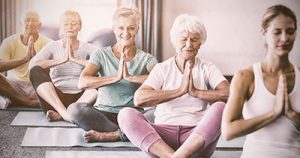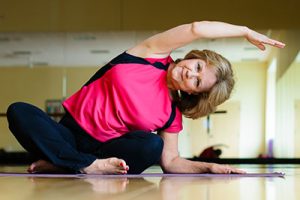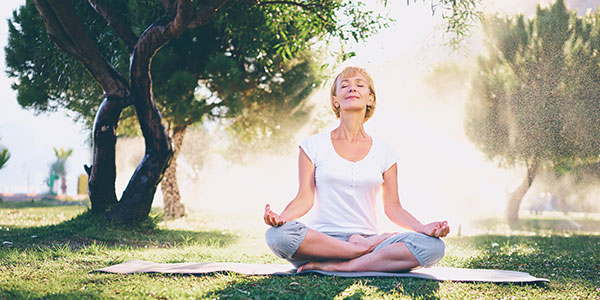Menopause is definitively diagnosed when a woman has been without a period for one year. Prior to this diagnosis, your periods may become irregular and you may even go months without having a period. This phase of irregularity is known as the perimenopausal phase. As fluctuating hormone levels continue, it can cause a myriad of unpleasant symptoms. You may experience fatigue, hot flashes, night sweats, irritability and depression.
Regular exercise is an excellent way to combat these unpleasant change of menopause, but did you know that yoga, specifically, can help regulate fluctuating hormone levels? Here are four ways that practicing self-care alleviates menopausal and even postmenopausal symptoms.
Yoga Lowers Blood Pressure, Reduces Night Sweats

In addition, for those suffering from night sweats, practicing yoga regularly, not only lowers your blood pressure, but also promotes blood circulation. In turn, better oxygenation can reduce both the frequency and intensity of night sweats.
Reduced Physical Stress
In addition to reducing mental stress, physical stress and tension can also be removed from regular yoga and meditative practice. One of the core components of yoga is controlled breathing. As such, practicing breathing techniques can help reduce anxiety levels and create a feeling of inner peace. When relaxation occurs, the muscles can ultimately release tension, which means your perception of symptoms is also less. By reducing this stress, you are able to eliminate the toll that stress plays on our aging bodies.
Higher Pain Threshold
In addition to hot flashes and night sweats, many women also suffer from aches and pains when transitioning into, and out of, menopause. Scientific findings show that yoga practitioners typically have more gray matter in multiple regions of the brain compared with individually matched people who did not practice yoga. What does this mean? It means that regular and long-term practice of yoga may improve pain tolerance.
Hypnosis and Mindfulness
Believe it or not, the way you see the world and how you feel about menopause and aging is important. If you have negative feelings towards these natural changes, you may interpret your symptoms differently than someone who sees menopause and aging as a new beginning.
Although menopause does signify the end of childbearing years, it’s also an opportunity to practice self-care and become more in tune with yourself. Hypnosis can minimize unpleasant symptoms while practicing mindfulness can help you appreciate the little things in life.
While many women might be skeptical about being hypnotized out of menopausal symptoms, a report, suggests that of all the alternative treatments offered to women, hypnosis was almost uniquely effective in alleviating symptoms of the menopause.
Be Positive

Finding time for yourself is one of the most important things you can do. Practicing relaxation techniques not only quiets your mind but can also reduce menopausal symptoms. Changing the way you see yourself and knowing how important self-care is requires time and patience.
Menopause is a time for a change. Think of it as the adolescence of getting older, but because you have more experience and confidence, you’re better equipped to deal with the highs and lows. Give yourself enough time to feel the way you want to feel. Your attitude will shape the experience and the way your body reacts to it. Catastrophic thinking only leads to negativity. Face your fears head on and find ways to see the positive in every day.





